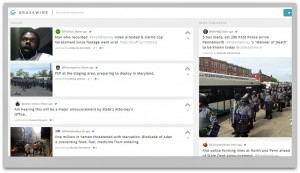Editor’s note: This project began in the fall of 2013 when students in two media law classes at the University of Maryland’s Philip Merrill College of Journalism conducted a survey of social media policies for student athletes at colleges and universities. With guidance from their professors, Deborah Nelson and Sandra Banisky, the students requested 10 different records from more than 80 athletic departments nationwide, including athlete codes of conduct and various documents pertaining to social media use. The UMD teams shared their findings with the Student Press Law Center, which assigned a staff writer to report the following story. (Find out more about how the students conducted their project here.)
Monitoring of student-athletes’ social media accounts is widespread among university athletic departments, according to the results of a public records audit carried out by journalism students at the University of Maryland.
The policies differ in severity and breadth, and detail sanctions that include written reprimands and team suspension, up to the loss of scholarships and dismissal from athletic teams.
“Do not have a false sense of security about your rights to freedom of speech,” read the social media policies at the University of Akron, Florida State University and Oklahoma State University. “Understand that freedom of speech is not unlimited.”
In partnership with the Student Press Law Center, the journalism students at UMD’s Philip Merrill College of Journalism polled 83 universities with NCAA Division I athletics programs and asked to see 11 documents pertaining to the regulation of student-athletes’ social media accounts, including blank copies of agreements that student-athletes must sign, as well as codes of conduct and scholarship agreements that include references to social media.
Not all of the schools had policies regarding social media. Of the schools surveyed, records showed that at least 59 individual university athletic departments restrict student-athletes’ use of social media. In some cases, students couldn’t confirm whether a school had policies because of difficulty accessing records.
“I think it had a lot to do with this ever-changing world of social media and Twitter,” said Scott Zlotnick, a senior broadcast journalism major at the University of Maryland and a teaching assistant in one of the classes that sent out requests. “In the last year or two, you see a lot of athletes getting in trouble on Twitter.”
How stringently social media guidelines are enforced or punished varies from athletic department to athletic department, and at some schools, from team to team. Many schools employ what boils down to a best-practices guide, but others have policies that require athletes to remove any content deemed questionable by administrators.
At public universities where First Amendment guarantees protect students, some legal experts have questioned whether students can lawfully be punished for online speech that is deemed (in the words of some colleges’ policies) “offensive” or “inappropriate,” particularly off-campus outside of school time.
‘A Privilege, Not a Right’
At many schools, social media policies warn students that participation in collegiate athletics is “a privilege, not a right.”
These schools believe that because student-athletes are in the public eye, they must follow a higher code of ethics, or as Indiana University puts it in a set of general guidelines for student-athletes: “(T)hey are expected to exhibit a higher standard of behavior and maturity than might be displayed by other students, staff, and faculty. They should always avoid conduct that could be perceived as improper or unfitting of a University representative.”
Missouri State’s athletic department also emphasizes reputational concerns in its policy, which forbids student-athletes from posting all content “which contain offensive or foul language that could embarrass or ruin the reputation of yourself, your family, your team, the athletic department or Missouri State University.” Missouri State’s policy also holds athletes responsible for “information, photos and items that may be posted by others on your page.”
When student-athletes fall short of these higher goals, the results can create a public relations nightmare for athletic departments.
A recent example of this kind of backlash universities fear occurred at Kent State University in February after a wrestler took to Twitter to voice his distaste for University of Missouri football player Michael Sam’s announcement that he was gay. The wrestler, junior Sam Wheeler, called Michael Sam a “fag” and tweeted other anti-gay remarks at the NFL draft prospect’s defenders.
Media outlets — from student newspaper The Daily Kent Stater up to the Huffington Post — published stories about his tweets. Kent State hastily released a statement rebuking Wheeler’s comments and took swift action to punish his speech. Wheeler has since been “indefinitely suspended” from the team.
Kent State provided a copy of its social media agreement to the SPLC, but a spokeswoman for the athletic department said that no one could be able to discuss Wheeler’s suspension or the social media policy.
“(W)e are just being extremely cautious about the subject right now,” wrote Lyndsey Maurer, the spokeswoman, in an email.
‘Helping Them [Be] Responsible’
Kent State’s policy, which student-athletes must sign, says the school can impose sanctions like “education, counseling, team suspension, termination from the varsity team and reduction or non-renewal of any athletic scholarships” for online content that isn’t “in a manner befitting highly visible members of the university community.”
Some universities explicitly require student-athletes to take down any content administrators deem unacceptable.
Florida State stipulates that students must abide by requests from officials “requiring that the unacceptable content be removed or the social network account be deactivated.” Failure to follow the policy can result in indefinite suspension or dismissal from the team and loss of financial aid, according to the policy.
“I agree to immediately remove any material that Texas Tech University asks me to remove,” reads a similar social networking policy for student-athletes at Texas Tech University. Texas Tech also requires students to provide usernames for several social networks to administrators.
Felicia Martin, the associate athletic director for academic services at Texas Tech, said there have been cases when administrators asked student-athletes to remove “riskier stuff” from online accounts.
“We want to be sure that we’re helping them with being responsible,” Martin said.
Martin doesn’t believe that these practices are infringing on student-athletes’ free speech rights.
“We totally respect students’ personal media presence. We respect that. We don’t say: ‘Don’t have Twitter. Don’t have Facebook. Don’t do Instagram,’ ” Martin said. “What we say is: ‘Be responsible.’ ”
Texas Tech is one of many universities that contracts a third-party company — in this case, YouDiligence — to monitor student-athletes on social media.
“Originally, when we started working with YouDiligence, (social media) was so new,” Martin said. “It was evolving so fast.”
It’s more than just Facebook and Twitter that are being monitored, too. Ohio State University, which also pays a private company, JumpForward, to keep tabs on athletes’ social media, warns student-athletes that administrators will monitor “social networks of all kinds, including but not limited to Facebook, Twitter, MySpace, LinkedIn, YouTube, Tumblr, Instagram and Flickr” for posts that “do not foster … positive team culture,” or that violate “team rules,” “athletic rules,” “university rules” or “applicable laws.”
The University of Maryland includes social media guidelines in its student-athlete code of conduct, which warns of sanctions like loss of scholarship or team dismissal. There are more than three pages of rules, including a passage detailing coaches’ authority.
A “head coach may prohibit the use of social media technologies immediately prior to, during, and following competition,” the student-athlete handbook says. “Violations of team guidelines regarding social media may subject student-athletes to additional, progressive remedial actions as determined by their respective head coach.”
A UMD student researcher requesting the records reached out to team coaches and found that the wrestling team has occasionally banned athletes from social media altogether.
“We have had one or two guys stop using social media for a period of time,” Coach Kerry McCoy wrote in a Nov. 26 email, adding that the bans last anywhere from one day to a month, due to “mainly poor choice of words or language.”
Social Media Policies Tied To NCAA Rules
A big part of schools’ monitoring is to ensure that student-athletes don’t run afoul of National Collegiate Athletic Association rules. In the past, players and schools have been penalized after social media posts brought to light evidence of rule-breaking.
After one student-athlete posted a picture of a recruit on Instagram, Jason Singleton, the associate director of compliance for Ohio State Athletics, sent a letter to student-athletes warning them against discussing or sharing photos of recruits. NCAA rules forbid student-athletes from posting or discussing a potential recruit’s campus visit on social media, Singleton said.
“Do not post pictures on social media sites of a recruit who is visiting campus,” Singleton wrote. “Do not make any comments on social media or any other media outlet regarding a recruit’s visit to campus.”
The NCAA says it doesn’t require its member institutions to monitor social media, though “the duty to do so may arise as part of an institution’s heightened awareness when it has or should have a reasonable suspicion of rules violations,” according an NCAA report.
Different Standards for Different Teams
Some schools allow team-specific agreements for social media. Generally speaking, the students conducting the records audit found that team regulations, in these cases, are heavier for the in-the-spotlight teams, Zlotnick said.
“We thought from the get-go: The football team is going to have different policies from a women’s field hockey team,” Zlotnick said. “They’re not under the same microscope.”
At the University of Georgia, for example, the athletic department makes just one mention of social media in the student-athlete handbook, but other guidelines, policies or agreements are also doled out on a team-by-team basis. The baseball, men’s basketball, football, swimming and diving, equestrian, women’s golf, gymnastics, soccer and women’s tennis teams all maintain rules for social media, records show.
The soccer, baseball and football teams require signed agreements to policies that reference social media. The document pertaining to the men’s basketball team encourages players to make their Facebook accounts private and says that “Twitter is only allowed with a signed agreement with Coach Fox and can be disallowed at any time.” The women’s golf team, on the other hand, had a simple bulleted list of 11 rules, with only one reference to social media. (No. 9: “Social Media Comments will be monitored.”)
Beyond Social Media: Guidelines for Sexual Behavior and ‘Dorm Cleanliness’
In addition to social networking etiquette, the acquired documents also shine a light on universities’ other expectations for student-athletes, like the University of Georgia’s men’s basketball policies, which detail guidelines for behavior, appearance and even sexual activities.
The university document outlines guidelines and expectations for the men’s teammates, offering advice on appearance, which is “very important in life” (hair “shaven, no braids”; coaches “don’t want sagging, should never see the crack of your ass”) and avoiding sexual violence(“No means no” and “Never assault or intimidate a woman”).
In the same document, team members are encouraged to “Treat women with respect,” and stay “out of gray areas, Orgies and gang bangs are inappropriate.” Additionally, “Hicky’s / passion marks should not ever be noticed by coaches,” and athletes should keep “One. Not two or three girlfriends . . .”
At the very end of the page, it’s asserted that officials have the right to inspect “dorm cleanliness” whenever they wish.
“We’re paying so we’re inspecting,” the document says. “I can enter the dorm at any time.”
Coach Mark Fox declined to comment through a spokesman.
None of the other policies that were examined detailed an assertion that coaches could enter dorm rooms at-will. Other restrictive policies include bans on cell phones during certain times.
The soccer team at the University of Colorado mandates that cell phones be turned off during team meals, tutoring sessions and athletic training, as well as meetings with anyone from the athletic department.
Likewise, the women’s soccer team at Western Kentucky University forbids team members from using their cell phones in class and during practice. Social networks are also prohibited between midnight and 5 a.m.
Coach Jason Neidell said these hours are when young people generally get into trouble.
“My mom said nothing good ever happens between 12 and 5,” Neidell said. “The problems that we’ve had with social media usually happen between 12 and 5 because the kids are out, they’re drinking or doing stuff they’re not supposed to be doing. If it’s good-enough material, they can wait and post it at 5:30.”
First Amendment Concerns
Policies that restrict speech — online or otherwise — present free speech issues. The Maryland audit surveyed public institutions, which must not infringe upon students’ First Amendment rights to freedom of speech. (Private universities are not bound by the First Amendment, although they may be bound by state laws or contractual agreements that give students similar free speech protections.)
There’s not a lot of case law to explain the extent to which colleges may police student-athletes’ speech, said Howard Wasserman, a law professor at Florida International University who specializes in sports. It would be up to a judge to determine whether a First Amendment violation occurred, he said.
When you’re talking about a student-athlete signing a contract, there could be disagreement over what is permissible, Wasserman said. Government bodies, like public universities, are purposefully limited in the kinds of terms or restrictions they can put on people when entering into contracts with them. In these cases, it could be argued that universities are enforcing one-sided terms on student-athletes, he said.
But from a practical standpoint, student-athletes are at the coaches’ mercy, Wasserman said. Unless there’s some type of apparent discrimination, a coach has significant leeway in setting policies, an argument that could hold up before a judge, he said.
“The athlete plays for the university at the coach’s discretion,” Wasserman said.
Alternatively, the student-athlete might argue that his or her speech can’t be scrutinized “outside the context of the team,” Wasserman said. These athletic departments want everything a student-athlete does to be categorized as a team action, but that might not be reasonable, he said.
Usually, the First Amendment doesn’t make room for bans on offensive speech.
“When you’re applying First Amendment principles, a prohibition on ‘offensive speech’ is never going to go anywhere because the notion of offensive or similar language, it is always going to be what the school happens to think what is offensive,” Wasserman said. “It’s totally subject to the whims of whatever the enforcing authority is, so that’s why concepts like ‘offensiveness’ are unknown to the First Amendment.”
But there are certain contexts in which the First Amendment doesn’t apply as “forcefully,” Wasserman said. Some employees, for example, can have their speech legally restricted. Whether student-athletes are a special case isn’t clear because it hasn’t been tested, he said.
Wasserman said policies that come from academic institutions like Akron, Florida State and Oklahoma State, warning students not to have a “false sense of security” about the First Amendment “might be one of the most offensive things I’ve ever heard in my life.”
As for the University of Georgia’s guidelines regarding consensual sexual activities, as well as dorm-room inspections, Wasserman called them “patently ridiculous.” The dorm room guideline, for example, asks student-athletes to waive their Fourth Amendment rights concerning unreasonable searches.
“It’s very broad,” Wasserman said. “They can get away with it because the athletes are going to let them get away with it.”
Should There Be Social Networking Privacy Laws?
Bradley Shear, a Bethesda, Md., attorney with an expertise in social media, has advocated for social networking privacy laws that protect individuals from being forced to provide social media account information like usernames and passwords to employers or schools.
More and more state legislatures are adopting laws to protect online speech, Shear said. Numerous states — like Illinois, Delaware and Utah — have implemented social networking privacy laws, he said. It’s a work in progress, however.
As a matter of colleges’ own self-interest, policing social networks adds another level of legal accountability that universities just shouldn’t have to deal with, Shear said.
He cited the family of Yeardley Love — a female lacrosse player who was killed by a male lacrosse player at the University of Virginia — as a cautionary tale for schools. The Loves sued the university for negligence in 2012, seeking tens of millions of dollars in damages. Though they later dropped the case, Shear said it’s a good illustrator of how schools could be held responsible for students’ actions: If the school had been monitoring the social media accounts of Love and her murderer, who were both athletes, what would administrators have known?
“With access comes responsibility,” he said. “If they have access, they’re going to be responsible. They don’t have that same type of duty in the offline duty. That’s the whole key. They just don’t get it.”









Leave a Comment